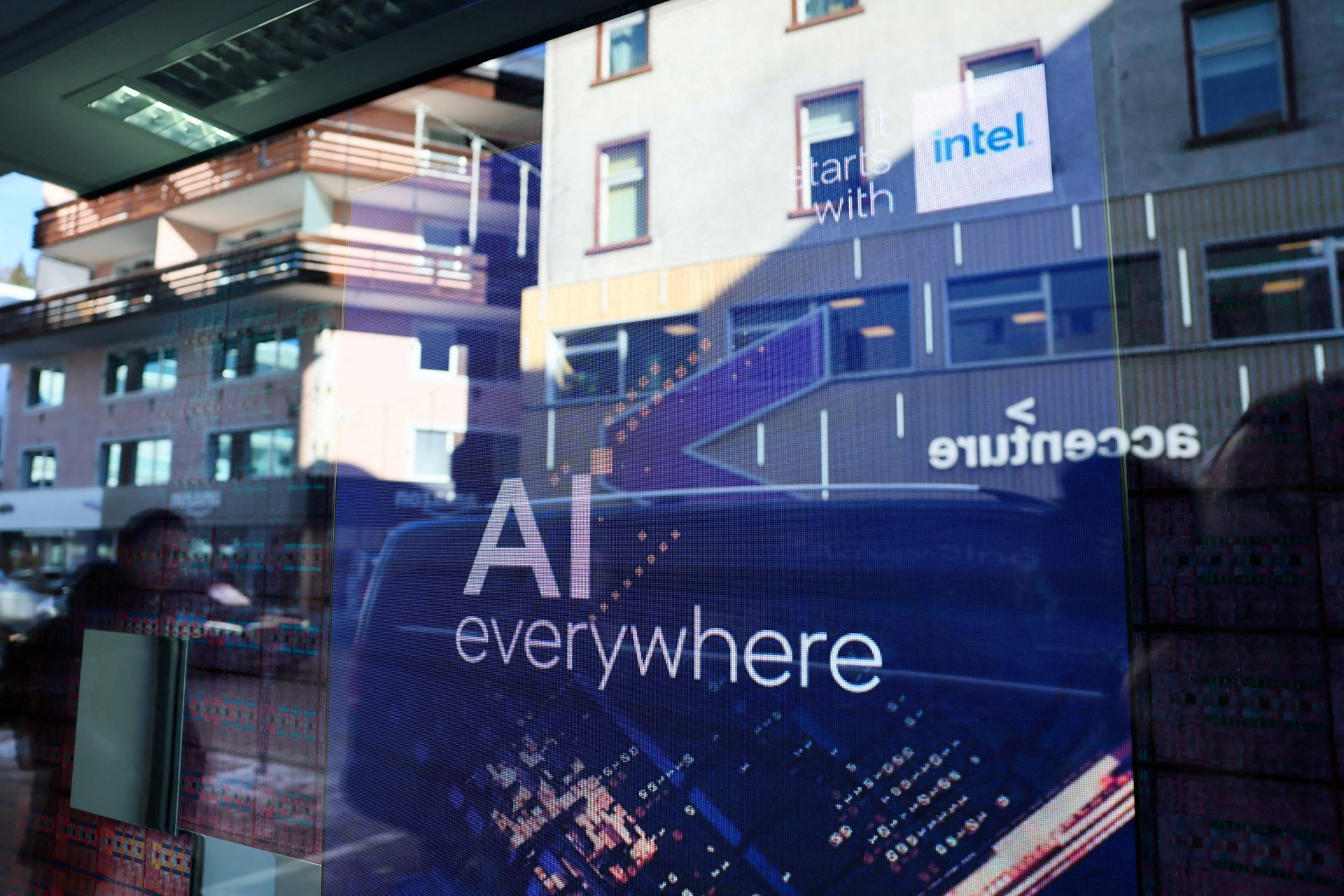Dispatch from Davos
AI hype, AI questions, and Sting's very fitting set list

Hi, Quartz members!
Suggested Reading
This week we were in Davos, Switzerland, for the annual meeting of the World Economic Forum. Artificial intelligence dominated the discourse, as well as signage on the Promenade, the central artery through town where companies, governments, and interest groups set up shop for the week and host hours of meetings and cocktail receptions on the sidelines of the official conference grounds.
Related Content
One of the nice things about AI is its versatility as a topic. It was easily woven into panels discussing almost every subject on the WEF’s agenda: trade, supply chains, climate, health, finance, elections, education, agriculture, and so on.
A handful of participants were bold enough to guess at what life will be like in the age of AI. But given humanity’s terrible track record of predicting the future—a task better suited for AI, perhaps?—it’s probably more worthwhile to pay attention to the the questions that leaders in business, politics, and civil society were asking about AI. (That said, the dueling forecasts of OpenAI chief Sam Altman and musician/Davos regular Will.i.am are really worth examining.)
You can catch up on all our Davos coverage here, but in a nutshell, here are some of the inquiries we heard in Davos this week:
🤜 Who will control the data inflows that will train large language models and how will it affect global trade?
😅 What can regulators—or workers—do to keep up with advances in AI?
🌍 When it comes to the development of AI infrastructure, will the Global South once again get left behind?
🧰 Where do AI models get their underlying data, and should they be forced to disclose their sources?
🤔 Why doesn’t Nvidia have more competition yet for its powerful computer chips?
⚡ How much additional energy will be needed to support all this computing, and will there be enough clean-energy capacity to produce it?
What are your burning questions about AI? Let us know; we’d love to hear from you.
Another busy hype cycle on the Promenade

The last time a new, largely unproven technology enjoyed huge levels of hype in Davos, the person whose name kept getting invoked wasn’t Sam Altman but Sam Bankman-Fried. So maybe it would be wise to let some skepticism enter the picture.
The prominence of AI on the Promenade in Davos was bound to inspire talk of bubbles, and not just the kind in champagne (though there was plenty of that on the Promenade as well). Crypto was a commonly heard comparison, but it’s not an especially good one. For all its hype, the idea of blockchain and digital currencies has never gotten anywhere near the breadth of buy-in that AI already enjoys in the business world, not just among techies and startup types but also within the corporate establishment.
A better comparison to the hype around AI might be the former fervor for “big data,” the buzz phrase of a decade and a half ago. It, too, was supposed to change everything, according to a wide variety of prognosticators. But suddenly, by 2015, everyone had stopped talking about it. One reason why is that we started using different language for the concept. A Netflix recommendation based on loads of data could just be a Netflix recommendation; no mention of “big data” was necessary to understand that.
But there were other reasons the hype died out. For one, the promise of “big data” was hard to grasp (the “OK, we have tons of data, now what do we do with it?” problem), and two, even if businesses were interested in taking advantage of “big data” analytics, many businesses never bothered getting their information in shape to do so.
That failure is coming into focus now, as companies start looking at how to gather and carve up their data so they can feed it into AI tools.
“I’m sure there are companies that have their data act together. But I’m equally sure there’s a lot of companies that don’t,” said Lisa Donahue, co-head of the Americas and Asia at the consulting firm AlixPartners.
The need for clean information
Salesforce, which makes customer relationship management software and is aggressively marketing the potential of its AI applications, sees lots of examples of this data messiness, too. Amy Weaver, the company’s president and chief financial officer, is advising businesses that now is the time to do a data deep-cleaning, ahead of investments they might make in AI.
“I think for a lot of companies, they don’t know fully where they want to go—or what’s possible— with AI. But what they can be doing right now is getting their data in order,” said Weaver. “They have to be really focused on data hygiene. We don’t want 15 different versions of Amy Weaver in the system; you want one, so that you know who you’re selling to, who you’re serving.”
But why would businesses that skipped this common-sense step during the big data craze of just a few years ago feel compelled to finally take on the painstaking task for the sake of an AI future no one really can predict?
“Leaders are realizing that this is such a powerful tool, and the way to harness it and actually make something of it is: the underlying data has to be a clean record,” AlixPartners’ Donahue said. “Big data before was kind of data for data’s sake. [With AI,] the average guy who’s not a techie can still tangibly understand where it can go, and can probably understand, ‘Ah, I actually need clean information in order to really be effective with this.’ So that’s what I think is a little bit different. The actual application is easier to visualize.”
But in case anyone is still struggling with that, AI, unlike “big data,” at least can create a visualization for us.
The WEF and women
Remarkably, 100% of the Davos attendees directly quoted in this newsletter thus far are women. We say “remarkably” because the 800 women on the WEF’s official attendee list, a record high for the organization, represented just 28% of the total participants. (H/T to Charter’s Kevin Delaney for digging up the stats on this year’s meeting.)
One 🎸 thing
Of course it wouldn’t be a WEF annual meeting without a famous musician sighting. Bono wasn’t here this year, but there were plenty of other big artists in the mix: American producer Nile Rodgers, West African singer Angelique Kidjo, Fugees co-founder Wyclef Jean, Black Eyed Peas founder Will.i.am, and Sting, who performed Thursday night at the annual Salesforce party.

Sting’s lengthy set list (for a corporate gig) included hits from his solo career as well as his years with The Police, along with a cover of a Bob Marley song, and it all was remarkably on point for the proceedings in Davos. Just look at how nicely the track titles align with actual session titles from the 2024 WEF meeting.
- “Message in a Bottle” ➡️ How Leaders and Policymakers Can Turn the Tide on Plastic Pollution
- “Englishman in New York” ➡️ Navigating a Fragmented World
- “Every Little Thing She Does is Magic” ➡️ GenAI: How it Works
- “If I Ever Lose My Faith in You” ➡️ Rebuilding Trust in Science
- “If You Love Somebody Set Them Free” ➡️ Empowerment Through Employment
- “Fields of Gold” ➡️ The Next Green Revolution: Tech-Enabled Agricultural Supply Chains
- “Brand New Day” ➡️ The New Social Contract
- “Shape of My Heart” ➡️ Strategic Public-Private Partnerships for Transforming Cardiovascular Health
- “Walking on the Moon” ➡️ Taming Competition in Low and High Orbit
- “So Lonely”/”No Woman, No Cry” ➡️ Next Steps for Digital Worlds/The Economics of Gender Parity
- “Desert Rose” ➡️ Out of Balance With Water
- “King of Pain” ➡️ How to Prevent an Anxious Generation
- “Roxanne” ➡️ The Prices We Pay
Have an elite weekend!
—Heather Landy, Quartz executive editor